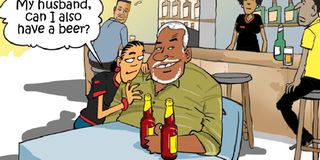THE PUB: He’s 60-plus, she calls him ‘husband’

What you need to know:
She, however, teases the grey haired man, who cannot remember the last time his children’s mother called him “darling”
Drinkers have the tendency to feel important, even when, like Wa Muyanza, they are not. While at the bar, you like to be called “mzee”, not because you cherish the idea of being reminded you’re past your prime, meaning it would be okay if you rejoined your Maker now, with people behind claiming the old geezer died, not of any illness, but simply due to “old age complications”.
At the bar, the barmaids and male spongers strive to make you believe you’re important, and when you thus feel and you happen to have money in your usually thin wallet, you become foolishly generous.
“Have one, kijana wangu, pata moja,” you’ll order the barmaid nearest to your table. You become even easier to fool when you’ve issues at home, like when the conduct of the brats who you accommodate, feed and pay school fees for make it look like it is they, not you, who is head of the house.
That, just because you don’t know how to change TV channels. Okay, you can’t operate the TV, but isn’t it you who bought the gadget? Isn’t it you who bought the king’amuzi? Young fellows who patronise the same bars with you don’t fuss about the fact that you aren’t on Facebook, Instagram, Tweeter (you aren’t a twit, why should you tweet?). However, the ones whose count on you for their very survival view you as a mshamba, even if they don’t say it in so many words.
Your better (ha!) half doesn’t help matters when she questions your habit of “wasting thousands upon thousands” while the main dish in your house comprises ugali and all manner of “edible grass”.
With this kind of mini tribe at the place you call home, who will fail to understand why you consider the “grocery” a better place to stay until you’re forced to leave by the unfortunate closing hour rule.
Your friend Ommy doesn’t leave the grocery until closing time because the woman whose five children call him dad (or “buda” behind his back), constantly accuse him of being unfaithful.
“Mama watoto strongly believes I come home late, not because I need to be out here with fellow men to exchange ideas, but because of some ‘small houses’ out there!” he laments as he refills his glass while summoning Tina, the pint-sized barmaid.
“Yes, my husband…another beer?” asks Tina.
“Oh, yeah, give me one for the road; it’s almost 11 o’clock, you know,” says Ommy.
“Can I have one also, my dear husband?” she says coyly.
“Of course; why not, my dear,” says Ommy.
Tina, who is hardly twenty, is of course, the furthest thing from being a wife to Ommy, a guy who was born several years before Tanganyika’s independence.
She, however, teases the grey haired man, who cannot remember the last time his children’s mother called him “darling”. The guy likes that, and Tina gets her beer and at times, a meal. It’s mutual.




